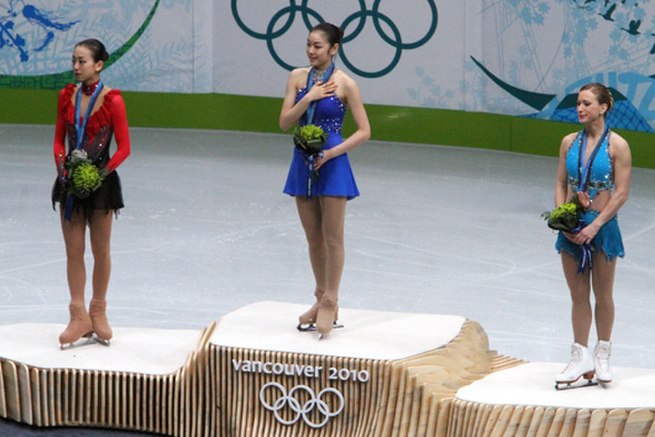
-
Podium
A podium (plural podiums or podia) is a platform used to raise something to a short distance above its surroundings. It derives from the Greek πόδι (foot). In architecture a building can rest on a large podium. Podia can also be used to raise people, for instance the conductor of an orchestra stands on a podium as do many public speakers.
Common parlance has shown an increasing use of podium in American English to describe a lectern.
In sports, a type of podium is used to honor the top three competitors in events such as the Olympics. In the Olympics a three-level podium is used. Traditionally, the highest level in the center holds the gold medalist. To their right is a somewhat lower platform for the silver medalist, and to the left of the gold medalist is an even lower platform for the bronze medalist. At the 2016 Summer Games in Rio, however, the Silver and Bronze were equal in elevation. In many sports, results in the top three of a competition are often referred to as “podiums” or “podium finishes”. In some individual sports, “podiums” is an official statistic, referring to the number of top three results an athlete has achieved over the course of a season or career. The word may also be used, chiefly in the United States, as a verb, “to podium”, meaning to attain a podium place.
-
Podium (noun)
A platform on which to stand, as when conducting an orchestra or preaching at a pulpit.
-
Podium (noun)
A stand used to hold notes when speaking publicly.
-
Podium (noun)
A steepled platform upon which the three competitors with the best results may stand when being handed their medals or prize.
-
Podium (noun)
A result amongst the best three at a competition.
-
Podium (noun)
A low wall, serving as a foundation, a substructure, or a terrace wall.
-
Podium (noun)
The dwarf wall surrounding the arena of an amphitheatre, from the top of which the seats began.
-
Podium (noun)
A foot or footstalk.
-
Podium (verb)
To finish in the top three at an event or competition.
“The swimmer podiumed three times at the Olympics.”
-
Stage (noun)
A phase.
“He is in the recovery stage of his illness.”
“Completion of an identifiable stage of maintenance such as removing an aircraft engine for repair or storage.”
-
Stage (noun)
A platform; a surface, generally elevated, upon which show performances or other public events are given.
“The band returned to the stage to play an encore.”
-
Stage (noun)
A floor or storey of a house.
-
Stage (noun)
A floor elevated for the convenience of mechanical work, etc.; scaffolding; staging.
-
Stage (noun)
A platform, often floating, serving as a kind of wharf.
-
Stage (noun)
A stagecoach, an enclosed horsedrawn carriage used to carry passengers.
“The stage pulled into town carrying the payroll for the mill and three ladies.”
-
Stage (noun)
A place of rest on a regularly travelled road; a station; a place appointed for a relay of horses.
-
Stage (noun)
A degree of advancement in a journey; one of several portions into which a road or course is marked off; the distance between two places of rest on a road.
“a stage of ten miles”
-
Stage (noun)
The number of an electronic circuit’s block, such as a filter, an amplifier, etc.
“a 3-stage cascade of a 2nd-order bandpass Butterworth filter”
-
Stage (noun)
The place on a microscope where the slide is located for viewing.
“He placed the slide on the stage.”
-
Stage (noun)
A level; one of the sequential areas making up the game.
“How do you get past the flying creatures in the third stage?”
-
Stage (noun)
A place where anything is publicly exhibited, or a remarkable affair occurs; the scene.
-
Stage (noun)
The succession of rock strata laid down in a single age on the geologic time scale.
-
Stage (verb)
To produce on a stage, to perform a play.
“The local theater group will stage “Pride and Prejudice”.”
-
Stage (verb)
To demonstrate in a deceptive manner.
“The salesman’s demonstration of the new cleanser was staged to make it appear highly effective.”
-
Stage (verb)
(Of a protest or strike etc.) To carry out.
-
Stage (verb)
To place in position to prepare for use.
“We staged the cars to be ready for the start, then waited for the starter to drop the flag.”
“to stage data to be written at a later time”
